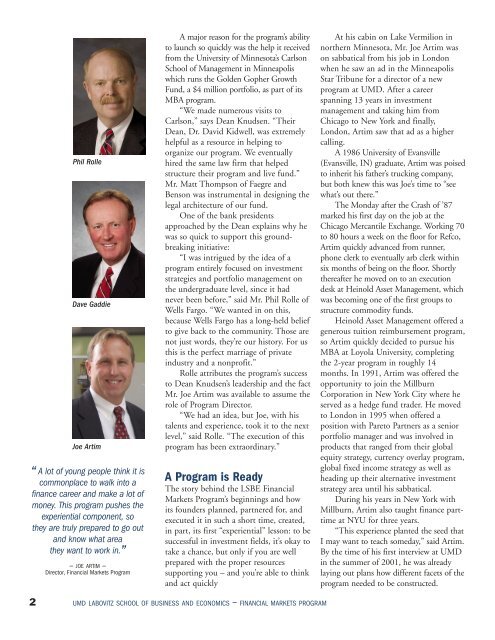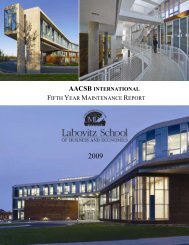Financial Markets Program - University of Minnesota
Financial Markets Program - University of Minnesota
Financial Markets Program - University of Minnesota
Create successful ePaper yourself
Turn your PDF publications into a flip-book with our unique Google optimized e-Paper software.
Phil Rolle<br />
Dave Gaddie<br />
Joe Artim<br />
“ A lot <strong>of</strong> young people think it is<br />
commonplace to walk into a<br />
finance career and make a lot <strong>of</strong><br />
money. This program pushes the<br />
experiential component, so<br />
they are truly prepared to go out<br />
and know what area<br />
they want to work in.”<br />
– JOE ARTIM –<br />
Director, <strong>Financial</strong> <strong>Markets</strong> <strong>Program</strong><br />
A major reason for the program’s ability<br />
to launch so quickly was the help it received<br />
from the <strong>University</strong> <strong>of</strong> <strong>Minnesota</strong>’s Carlson<br />
School <strong>of</strong> Management in Minneapolis<br />
which runs the Golden Gopher Growth<br />
Fund, a $4 million portfolio, as part <strong>of</strong> its<br />
MBA program.<br />
“We made numerous visits to<br />
Carlson,” says Dean Knudsen. “Their<br />
Dean, Dr. David Kidwell, was extremely<br />
helpful as a resource in helping to<br />
organize our program. We eventually<br />
hired the same law firm that helped<br />
structure their program and live fund.”<br />
Mr. Matt Thompson <strong>of</strong> Faegre and<br />
Benson was instrumental in designing the<br />
legal architecture <strong>of</strong> our fund.<br />
One <strong>of</strong> the bank presidents<br />
approached by the Dean explains why he<br />
was so quick to support this groundbreaking<br />
initiative:<br />
“I was intrigued by the idea <strong>of</strong> a<br />
program entirely focused on investment<br />
strategies and portfolio management on<br />
the undergraduate level, since it had<br />
never been before,” said Mr. Phil Rolle <strong>of</strong><br />
Wells Fargo. “We wanted in on this,<br />
because Wells Fargo has a long-held belief<br />
to give back to the community. Those are<br />
not just words, they’re our history. For us<br />
this is the perfect marriage <strong>of</strong> private<br />
industry and a nonpr<strong>of</strong>it.”<br />
Rolle attributes the program’s success<br />
to Dean Knudsen’s leadership and the fact<br />
Mr. Joe Artim was available to assume the<br />
role <strong>of</strong> <strong>Program</strong> Director.<br />
“We had an idea, but Joe, with his<br />
talents and experience, took it to the next<br />
level,” said Rolle. “The execution <strong>of</strong> this<br />
program has been extraordinary.”<br />
A <strong>Program</strong> is Ready<br />
The story behind the LSBE <strong>Financial</strong><br />
<strong>Markets</strong> <strong>Program</strong>’s beginnings and how<br />
its founders planned, partnered for, and<br />
executed it in such a short time, created,<br />
in part, its first “experiential” lesson: to be<br />
successful in investment fields, it’s okay to<br />
take a chance, but only if you are well<br />
prepared with the proper resources<br />
supporting you – and you’re able to think<br />
and act quickly<br />
2 UMD LABOVITZ SCHOOL OF BUSINESS AND ECONOMICS – FINANCIAL MARKETS PROGRAM<br />
At his cabin on Lake Vermilion in<br />
northern <strong>Minnesota</strong>, Mr. Joe Artim was<br />
on sabbatical from his job in London<br />
when he saw an ad in the Minneapolis<br />
Star Tribune for a director <strong>of</strong> a new<br />
program at UMD. After a career<br />
spanning 13 years in investment<br />
management and taking him from<br />
Chicago to New York and finally,<br />
London, Artim saw that ad as a higher<br />
calling.<br />
A 1986 <strong>University</strong> <strong>of</strong> Evansville<br />
(Evansville, IN) graduate, Artim was poised<br />
to inherit his father’s trucking company,<br />
but both knew this was Joe’s time to “see<br />
what’s out there.”<br />
The Monday after the Crash <strong>of</strong> ’87<br />
marked his first day on the job at the<br />
Chicago Mercantile Exchange. Working 70<br />
to 80 hours a week on the floor for Refco,<br />
Artim quickly advanced from runner,<br />
phone clerk to eventually arb clerk within<br />
six months <strong>of</strong> being on the floor. Shortly<br />
thereafter he moved on to an execution<br />
desk at Heinold Asset Management, which<br />
was becoming one <strong>of</strong> the first groups to<br />
structure commodity funds.<br />
Heinold Asset Management <strong>of</strong>fered a<br />
generous tuition reimbursement program,<br />
so Artim quickly decided to pursue his<br />
MBA at Loyola <strong>University</strong>, completing<br />
the 2-year program in roughly 14<br />
months. In 1991, Artim was <strong>of</strong>fered the<br />
opportunity to join the Millburn<br />
Corporation in New York City where he<br />
served as a hedge fund trader. He moved<br />
to London in 1995 when <strong>of</strong>fered a<br />
position with Pareto Partners as a senior<br />
portfolio manager and was involved in<br />
products that ranged from their global<br />
equity strategy, currency overlay program,<br />
global fixed income strategy as well as<br />
heading up their alternative investment<br />
strategy area until his sabbatical.<br />
During his years in New York with<br />
Millburn, Artim also taught finance parttime<br />
at NYU for three years.<br />
“This experience planted the seed that<br />
I may want to teach someday,” said Artim.<br />
By the time <strong>of</strong> his first interview at UMD<br />
in the summer <strong>of</strong> 2001, he was already<br />
laying out plans how different facets <strong>of</strong> the<br />
program needed to be constructed.



